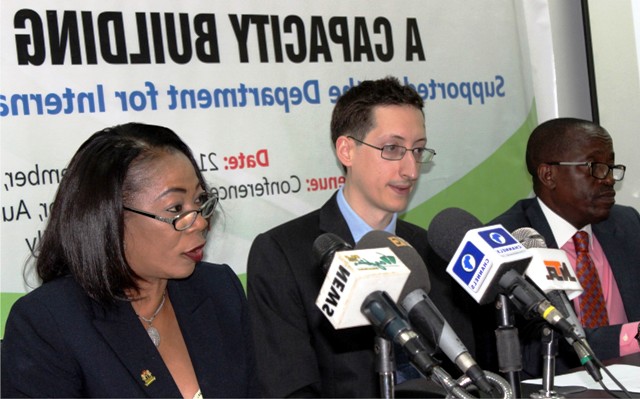Business
Stakeholders Reach Pact On Apapa Wharf Road Reconstruction

Stakeholders of the Apapa Wharf Road reconstruction have reached an agreement to take necessary measures to ensure commencement of reconstruction of the road leading to the nation’s major port on July 7.
The stakeholders agreed on several issues at a meeting held at the office complex of the Federal Ministry of Power, Works and Housing headquarters in Lagos, Thursday.
Those in attendance include representatives of traffic regulatory and traffic management agencies, law enforcement agencies, transport unions, petroleum products unions, port terminal operators and the Nigerian Port Authority (NPA).
Others are telecommunication service providers, the Apapa Local Government, representatives of Federal Ministry of Power, Works and Housing, AG Dangote Construction Company Ltd, contractors on the project, among others.
The stakeholders, rising from the meeting, presented a communique read by Mr Godwin Eke, Federal Controller Works, Lagos and a consultant of AG Dangote Construction Company Ltd, Mr Kayode Opeifa.
They agreed that the Federal Ministry of Power, Works and Housing and NPA should collaborate to repair all bad roads and diversion routes, including Tin Can Island Road, Creek Road and Oshodi-Apapa Expressway, which will receive heavy traffic.
The stakeholders resolved that a meeting be held between traffic regulatory agencies, law enforcement agencies and the Lagos State Traffic Management Authority (LASTMA) on July 3 (today) to fashion out a traffic management plan.
“After the meeting and the discussions and approval, it will be communicated to all stakeholders. Then, we can ask the contractors to mobilise and begin the reconstruction of Apapa Wharf Road.
“We all resolve to ensure that parked trucks be removed from Apapa Wharf Road for construction works to commence in phases on 7th July; it will never be a total closure of all the roads, but only on sections of the road where work will be done,” the communique stated.
They agreed that stakeholders will coperate with any changes in time line of traffic management which will be communicated to all parties by both the NPA and the contractor through LASTMA, for effective traffic diversions during the period.
The stakeholders also resolved that traffic management agencies would come up with a periodic traffic management plan backed by security provided by the security agencies.
They agreed that the Sole Administrator of Apapa Local Government, Mr Luqman Alao, would work with all traffic management agencies, security agencies and the NPA, and coordinate activities between them and the military.
The stakeholders commended the NPA, AG Dangote, Flour Mills of Nigeria and the Federal Ministry of Power, Work and Housing for coming together to execute the project.
The Tide source gathered that the Minister of Power, Works and Housing, Mr Babatunde Fashola, on June 17, handed over the Apapa Wharf Road to AG Dangote Construction Company Ltd for reconstruction.
The site was handed over after the minister signed a N4.34 billion Memorandum of Understanding with stakeholders who were to fund the project.
The project is to be funded by AG Dangote Construction Company Ltd, an arm of the Dangote Group, the Nigerian Ports Authority (NPA) and Flour Mills of Nigeria.
The Ministry of Power, Works and Housing, on June 22, held the first stakeholders meeting with some concerned parties on how to achieve success and speed on the project.
The ministry held another meeting with telecommunication service providers and others on Wednesday on how to relocate service cables and pipes in the Right of Way of the project.
The two kilometre road has a completion period of one year.
Transport
Automated Points Concession : FAAN Workers Gave 72hrs To Revise Decisions In PH

Transport
FAAN Announces Pick-Up Points for Go-Cashless Cards

Business
Fidelity Bank To Empower Women With Sustainable Entrepreneurship Skills, HAP2.0
-
Politics3 days ago
2027: NIGERIANS FAULT INEC ON DIGITAL MEMBERSHIP REGISTER DIRECTIVE
-

 Environment3 days ago
Environment3 days agoLAWMA Director Says Sweeping Reforms Have Improved Waste Collection
-
Politics3 days ago
LP Crisis: Ex-NWC Member Dumps Dumps Abure Faction
-

 Politics3 days ago
Politics3 days agoUmahi Dismisses Allegations On Social Media, Insists On Projects Delivery
-

 Sports3 days ago
Sports3 days agoAbia Not Sure To Secure continental Ticket
-
Sports3 days ago
La Liga: Yamal Records First Career Hat-trick
-
Politics3 days ago
NATASHA ELECTRIC VEHICLES INITIATIVE IN KOGI CENTRAL
-

 Sports3 days ago
Sports3 days agoCity Survive Leeds’ Challenge At Elland Road

